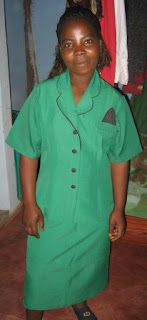I think the aspects of poverty that stands out the most here is vulnerability and lack of choice. It is harvest season so people don’t seem in destitute, but there is this sense of insecurity. Some people will run out of food before the next harvest. So many people are just getting by. What if there is a drought, or pest problem, or market prices crash? There are no government safety nets, there is no savings, and the likelihood is that friends and family will be in the same situation. So many things could go wrong that could send a household into a desperate state. A bad harvest is not a matter of less profit or going bankrupt, it is a matter of not being able to feed and clothe your family.
The one advantage to poverty in the rural area is that at least there are not as great of inequalities. There are definitely people who are better off than others, but most people are of the relatively the same social status. The main images of wealth come from western influence, mainly in the form of media and products. Such a disservice we do the world.
The other characteristic of poverty that strikes me is the lack of choices people have available to them. Many people want to continue education after primary school, but can’t afford to. There are few jobs available, even for those with some education. It is hard to take the risk of doing things differently if you are just getting by. I am hesitant to ask young people what they want to do when they are older, because I know it is not really a matter of what they “want”. So many people tell me they want to go to Canada; the land of opportunity, but the chance of them raising the funds to leave Malawi is slim. I’ve also been asked how easy it is to sneak into Canada and work illegally.
Living here makes me view my life and the western lifestyle in a new light. I can travel anywhere in the world. If I want to eat a chocolate bar I can just go buy it. I can choice what school to go to. I can get a job fairly easily. I can go to the doctors when I get sick. The worries I have seem so insignificant. I have security and choice, two things that everyone should have.













